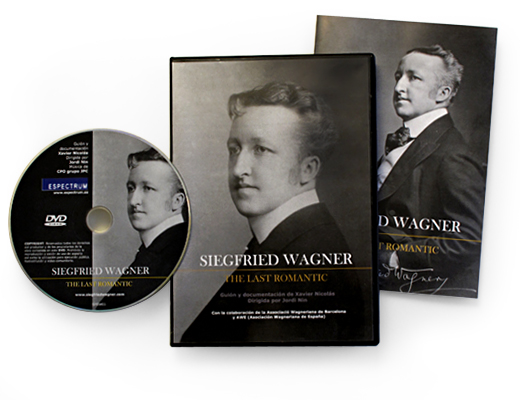About Siegfried Wagner
Siegfried Helferich Richard Wagner was born on 6th June 1869 in the famous swiss house of Triebschen, where Richard Wagner gave his wife Cosima the immortal "Siegfried Idyll" in a period of peace and tranquillity of the composer. The atmosphere surrounding Siegfried during his childhood undoubtedly affected the rest of his life. His father in those years was to develop his best works, the launch of "Ring" and "Parsifal". He spent his childhood between Bayreuth and Italy until 1883.
At just 14 years old, the death of his father in 1883 was a hard blow for an adolescent who idolized his father,mentor and friend. From then on his relationship with his mother became much closer. In order to continue with the Bayreuth festivals the young Siegfried was educated amongst the theatre sets and completely immersed in the world of opera.
One of Siegfried's musical teachers was Engelbert Humperdinck, the composer of "Hansel and Gretel", an influence that would later be seen in his own works. The cultural and artistic preparation that Siegfried Wagner received greatly helped his future career, living in an atmosphere immersed in music, his father composing, the piano concerts of his grandfather Listz, the lessons with Humperdinck, numerous visits by composers and singers, the "Festpielhaus"... All these things guided him on an artistic path.
When Siegfried was 39, Cosima became too frail to direct the festivals and so named her son as the successor of the "Festpielhaus" (in the same way Richard Wagner did with Cosima and in later years Siegfried would do with his wife Winifred). As the head of the Festpielhaus, Siegfried did a marvellous job as musical director, Scenery director, Singing director, programmer …
He was an excellent musical director although he preferred composing. During those years and to gather funds for the "Festpielhaus", he travelled all over Europe giving concerts and directing operas. He was in Spain in 1907 giving a series of concerts at the Liceo Theatre, invited by the Barcelona Wagner Society. He obtained excellent reviews directing works by his father ("Tannhäuser", "Der fliegende Holländer", and "Siegfried"), and his grandfather ("Tasso") as well as his own works.
Siegfried Wagner adapted and created new productions from his fathers works, which were well received by critics and the public who saw in him a fresh approach in a perhaps otherwise rather stagnated Bayreuth. He made a special emphasis on the choreography and the choir, globally transforming the piece, but with a deep respect for his fathers original work.
His productions of "Der fliegende Holländer" in 1901 and "Lohengrin" in 1908 with the introduction of cycloramas for the first time and the three-dimensional effects provoked an extraordinarily positive and unanimous review from the Wagnerians.
This caused the growth of affluence in Bayreuth, helped by an excellent PR campaign by Siegfried and his wife Winifred. Bayreuth rose again, only to be buried during World War 1, rising again to reach its most splendid years in the 30s and 40s, only to expire in 1945.
In the same way as his father, Siegfried Wagner also discovered new talents, young singers in whom he trusted and nurtured: Lilly Hafgren-Waag, Alfred von Bary, Heinrich Schultz, Edyth Walker, Allen Hinckley, Gertrude Rennyson, Bennet Challis... As well as the already recognized talents who would pass through the Festpielhaus like Ellen Gullbranson, Walter Soomer, Ernestine Schumann-Heink, and Bahr-Mildenburg amongst others.
The Musical directors who collaborated during this period were also very important. As well as the grand Hans Richter who would retire during Siegfrieds era, other important figures were Karl Much and Michael Balling.
Siegfried Wagner died on 4 th August 1930 just a few weeks after his mother. He died of a sudden heart attack in the middle of the whirlwind of the Festivals. He died whilst preparing "Tannhäuser", a stressful project which provoked his sudden and early death at the age of 61. In 1916 just 14 years earlier he had married an English woman, Winifred Williams with whom they had 4 children: Wieland, Wolfgang, Verena and Friedlind. Siegfried Wagner died dedicated to the honour and the lasting memory of his fathers works and to the fulfilment of beauty through his own works .


